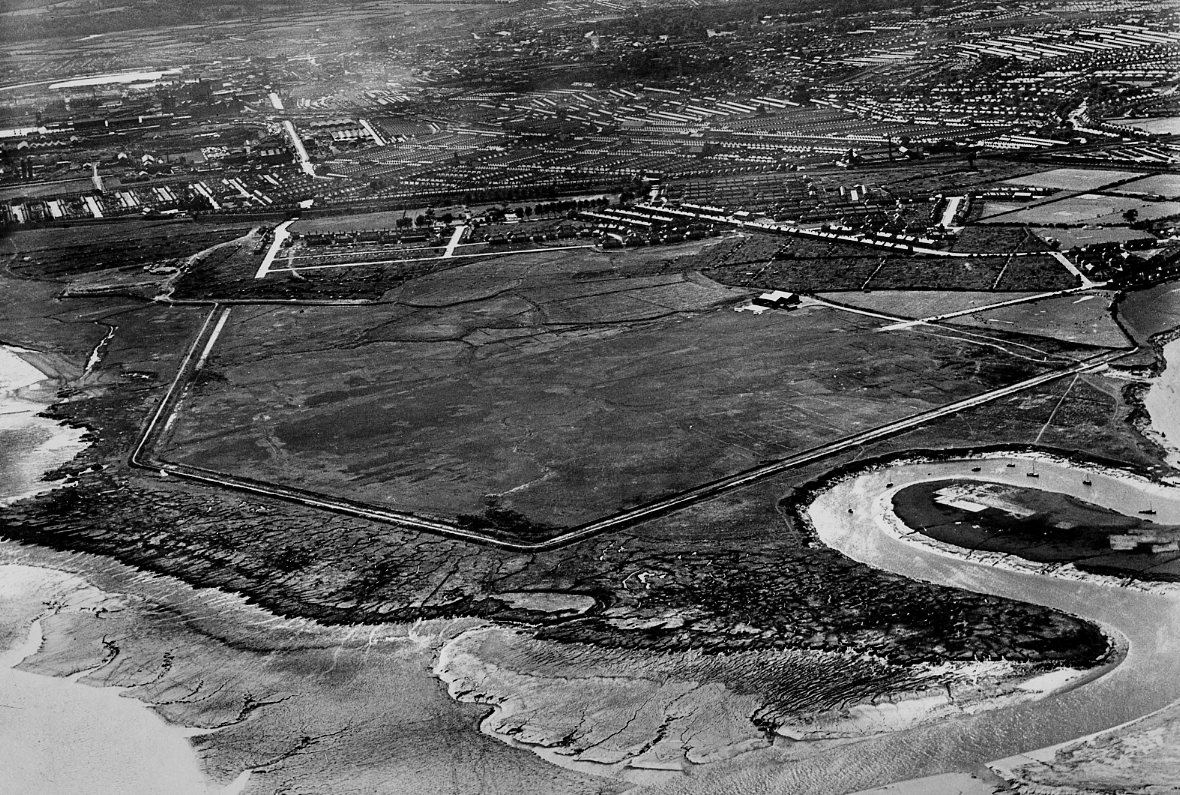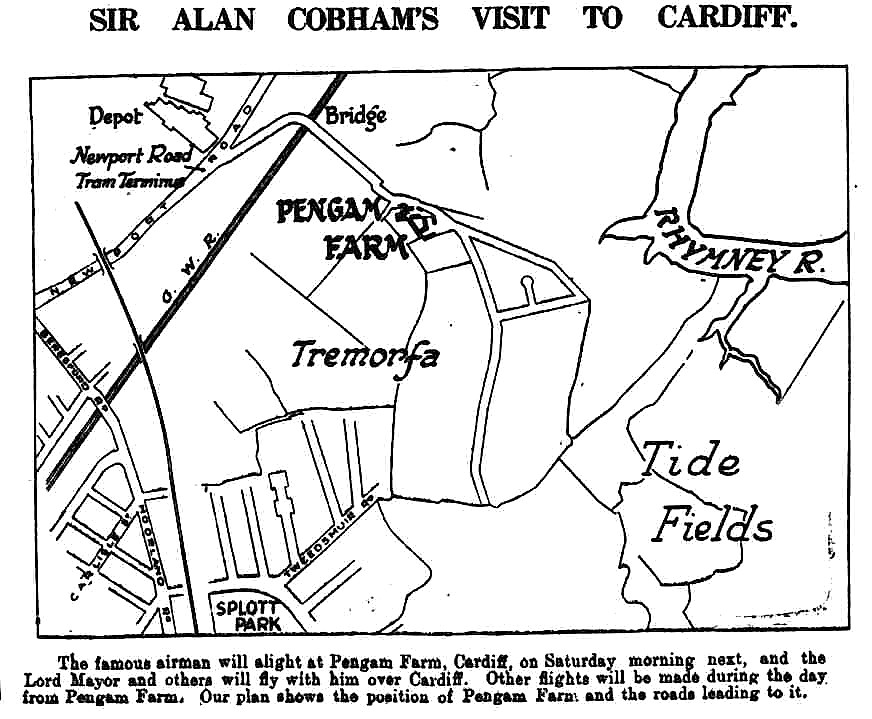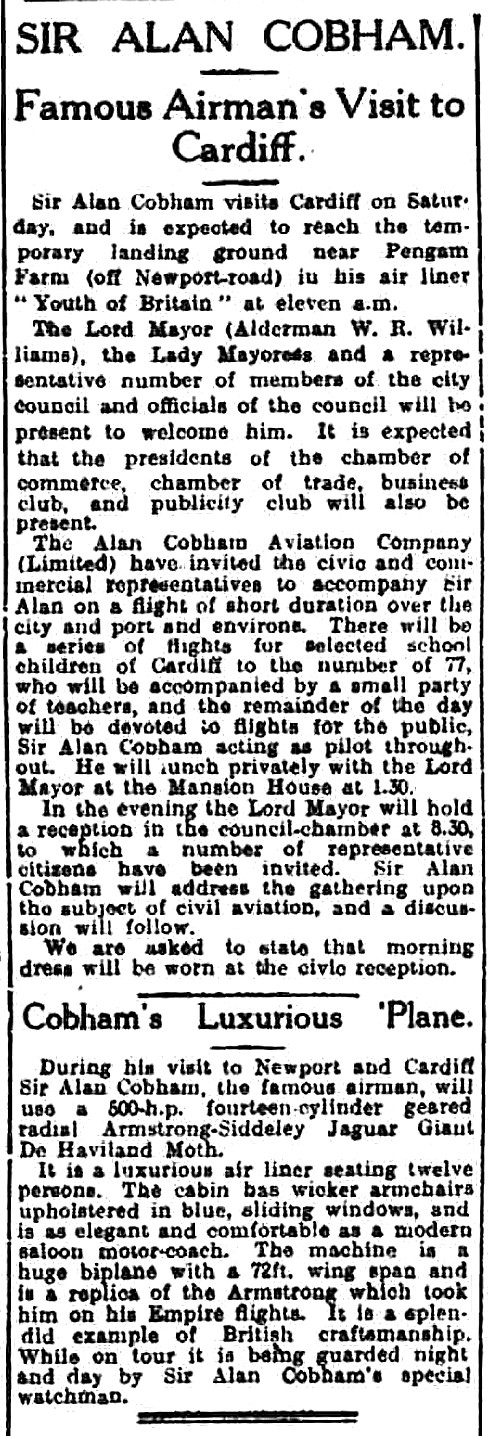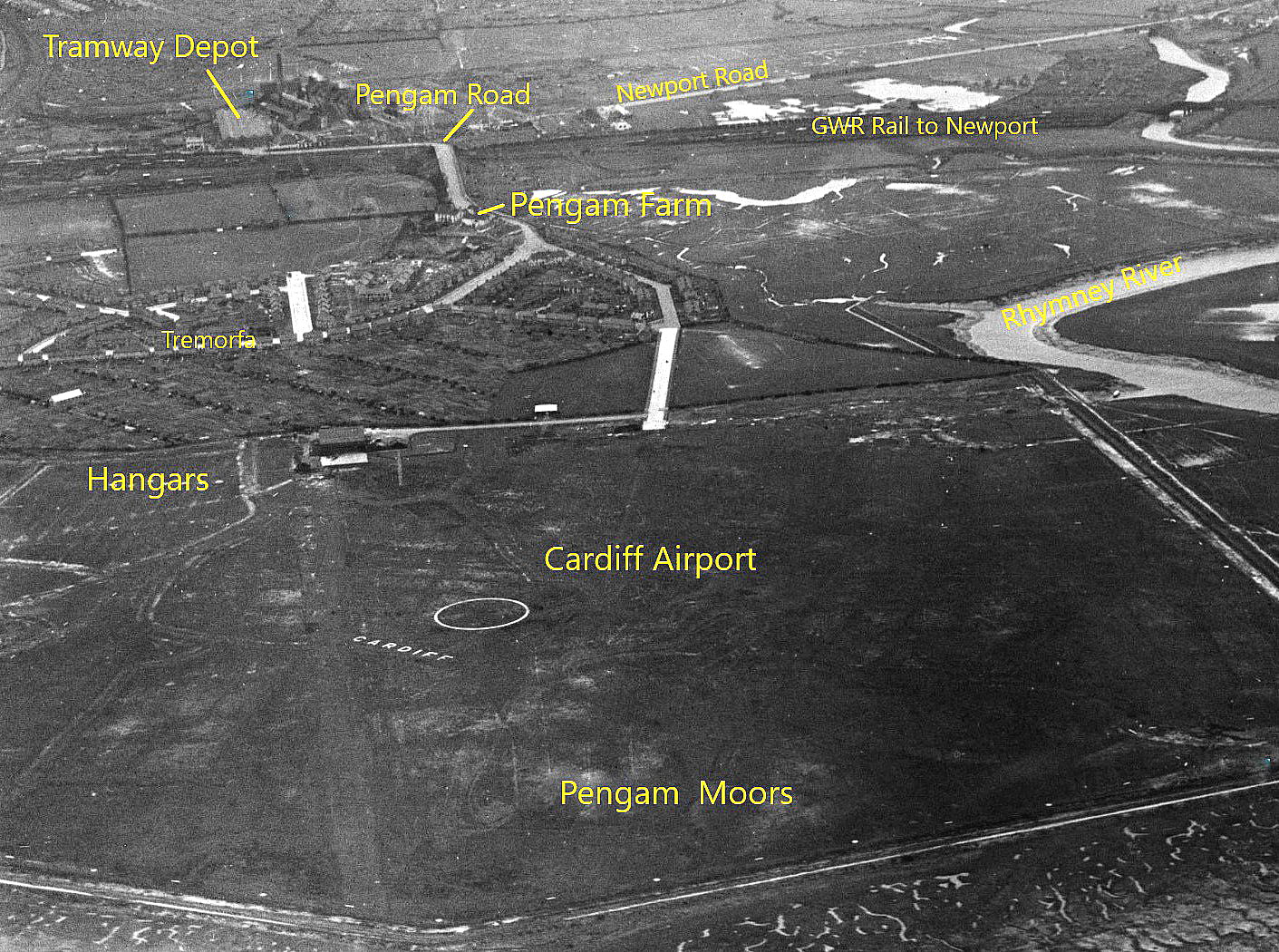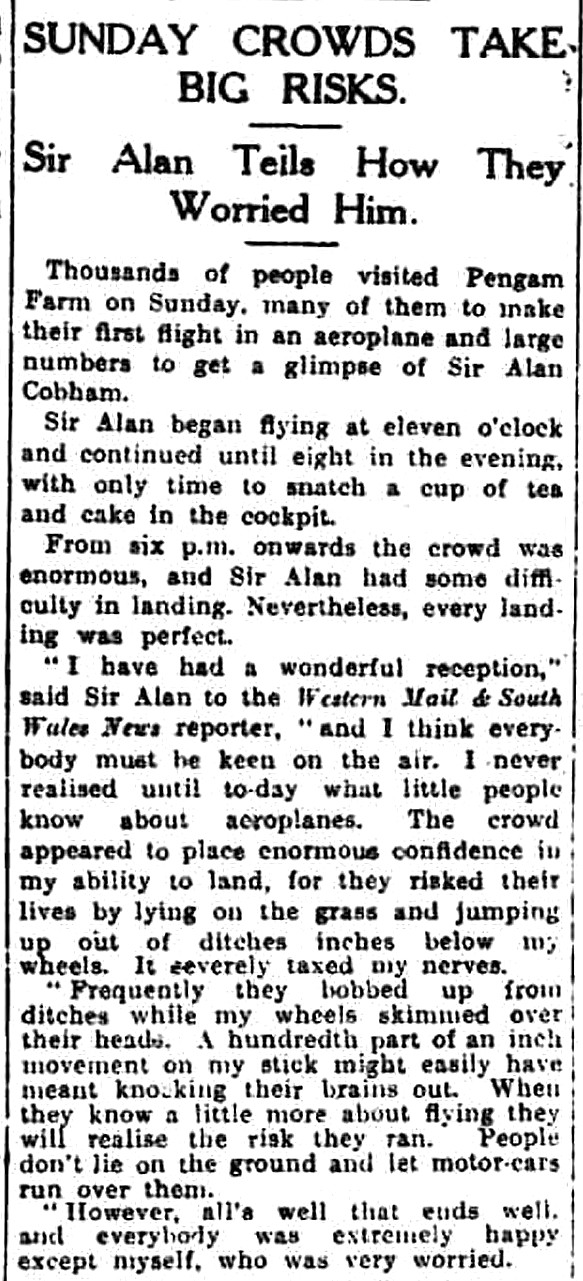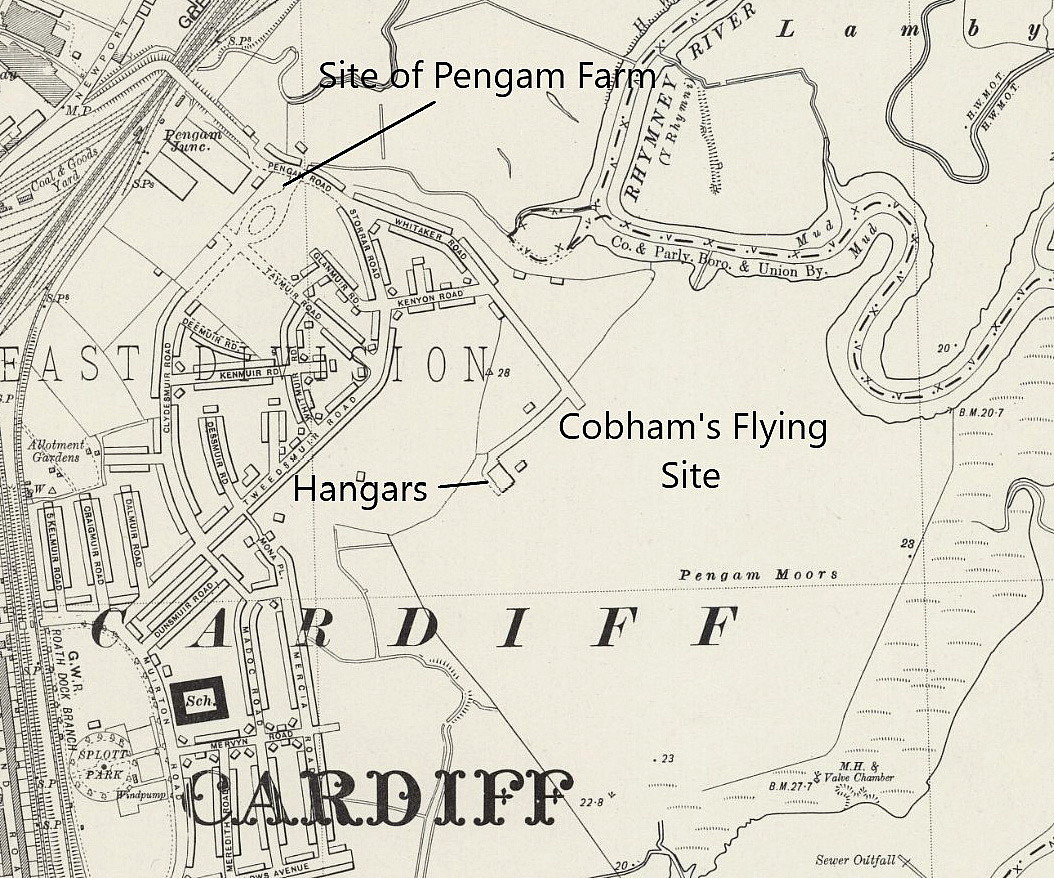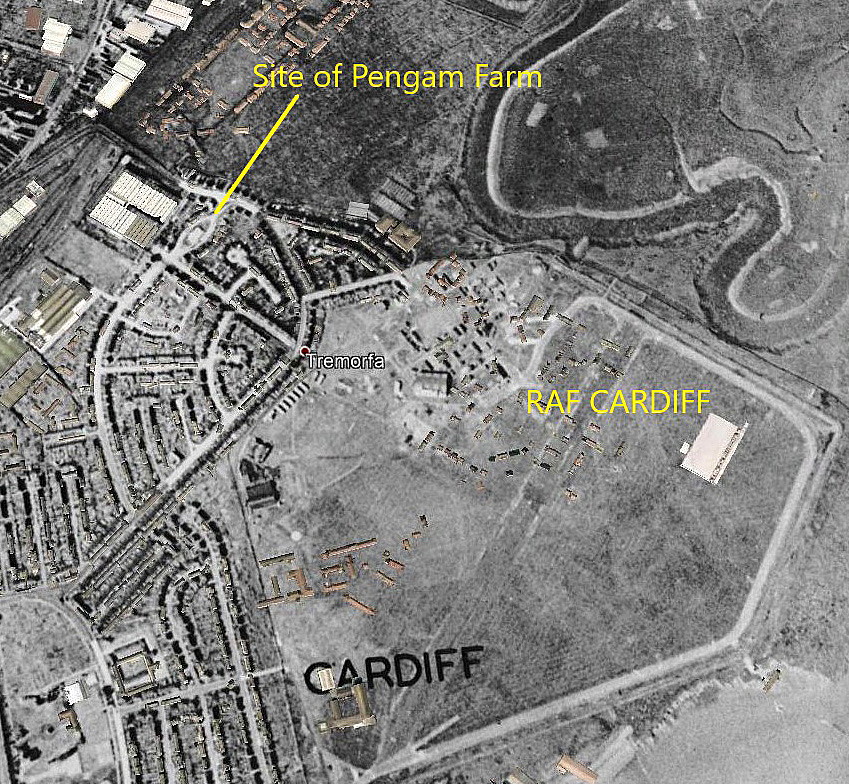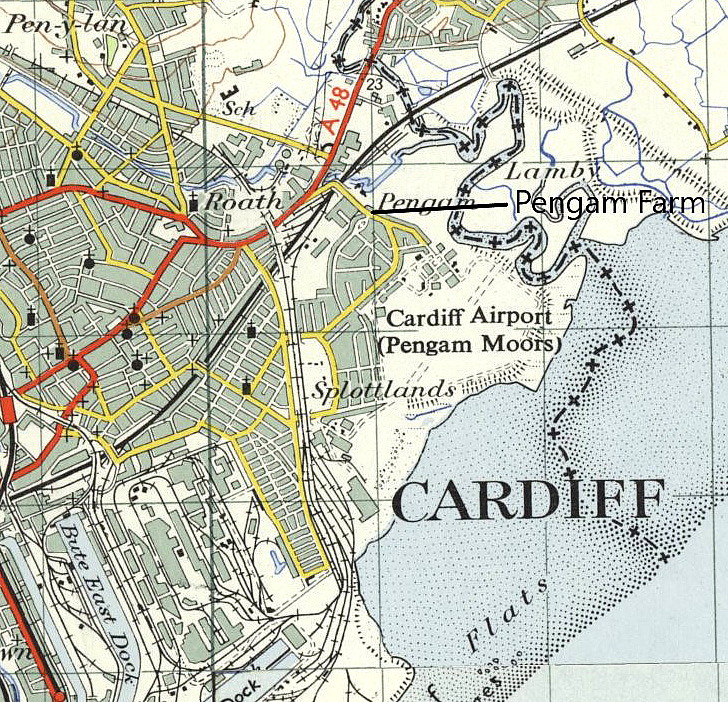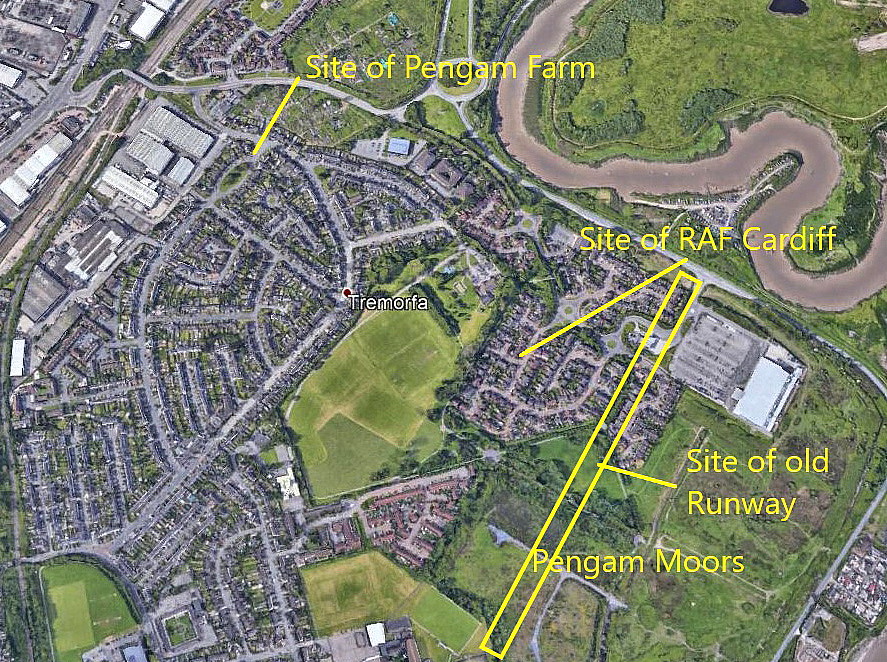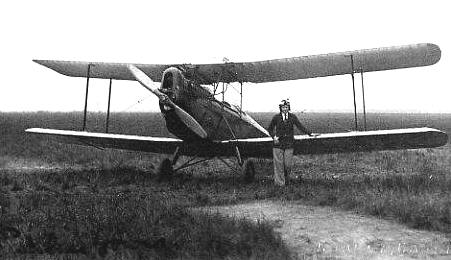Pengam Moor
PENGAM MOOR: Civil aerodrome/regional airport (Aka SPLOTT & RAF CARDIFF in WW2)
Note: The John Stroud Collection:
Operated by: Pre WW2: Cardiff Aeroplane Club on behalf of Cardiff Corporation
A MICHAEL T HOLDER GALLERY
Note: The map and the two articles were published in the Western Mail newspaper.
NOTE: It is hard to judge just how much influence Sir Alan Cobham's visit on the 31st August 1929 during his Municipal Aerodrome Campaign had on the decision to open this aerodrome, as it wasn't opened until Sptember 1931 - two years later. He mostly used the de Havilland DH61 'Giant Moth' G-AAEV, named 'Youth of Britain' which could carry ten passengers.
Originally Cobham planned to visit 107 venues spread around mainland Britain, between May and October 1929. In the end he managed to visit about 95, which in itself was a major achievement. His normal practise was to take local worthies such as the mayor and leading councillors for a flight around the local area. Following a slap-up luncheon, usually in the town hall where he extolled the virtues of having a proper aerodrome/regional airport, he would then take at least forty selected school children for local flights.
These were sponsored and paid for by Lord Wakefield of Castrol Oil fame, although at the time he remained anonymous. Afte this Cobham would take fare-paying passengers up, usually till dusk - presumably to raise funds to keep the Campaign going.
Military users: WW2:
1939: National Air Communication Unit (Using a variety of civil aircraft impressed for military use during the war)
From November 1940: No.8 AACU [Anti-Aircraft Unit] (Variety of civilian types, plus Bristol Blenheims, Airspeed Oxfords, Miles Martinets, Westland Lysanders and de Havilland DH89A Dominies) It appears this Unit was dispersed around the U.K. in December 1943.
Also, from 1940 until 1945, 43 M.U. (Maintenance Unit) who packed and despatched aircraft for duties overseas.
US Army Air Corps (I have found a record stating this was the case, but without any details. Can anybody kindly offer advice? I suspect this would have been during the lead up to the D-Day landings?). In October 2024 Mr Martin Chamberlain kindly came to the rescue telling us that the U.S. Army Air Corps were actually based at LLANISHEN Glider Field. They departed without local notice, just before D-Day. See seperate listing.
CIVILIAN OPERATIONS
British airlines: Pre 1940: Cambrian Air Services, Great Western Railway Air Service, Great Western & Southern Air Lines, Lundy & Atlantic Coast Airlines, Railway Air Services, Western Airways (?)
Charter/air taxi: Pre 1940: Cambrian Air Services
Post 1945: Cambrian Air Services
Flying Clubs: Pre 1940: Cardiff Aeroplane Club, Cardiff Ultralight Flying Group
Post 1945: Cardiff Aeroplane Club
Note: In the 1957 The Aeroplane directory, Cardiff Aeroplane Club are listed as operating: One Auster, one de Havilland DH87B Hornet Moth and four de Havilland DH89A Tiger Moths.
Also listed was the Cardiff Ultra Light Flying Group, an affiliate member of the Popular Flying Association.
Flying school: Pre 1940: Cambrian Air Services, South Wales Airways*
Pleasure flying: Post 1945: Cambrian Air Services
Location: On the coast near to and E of Cardiff
Period of operation: (1932?) 1933 to 1954
Runways: ‘All-over’ grass airfield? Max. landing run: 883 grass
1942: One source claims that a hard concrete runway of 853 metres was laid out. However, the 1945 aerial photo above appears to show this is incorrect. It was probably
NOTES:
It appears the first airline user of PENGAM MOOR was Great Western Railway Air Service who inaugrated a service on the 12th April 1933 linking Cardiff with Teignmouth (HALDON) and Plymouth (ROBOROUGH) using the Westland Wessex G-AAGW leased from Imperial Airways. Or, did Norman Edgar & Co use this site when they started an air ferry service to Bristol (WHITCHURCH?) on the 26th September 1932 with the Fox Moth G-ABYO? This company changed its name to Norman Edgar (Western Airways) in September 1933.
*I cannot yet find details of where South Wales Airways Ltd operated from in the Cardiff area, it could have been SPLOTT or indeed just another convenient field in the area. It appears they operated Avro 504Ks from Cardiff and Bridgend for ‘joy-rides’.
However, another source found in 2021 states that the first user was the British Air Navigation Co Ltd in 1932, using Fokker 'Spiders; (presumably F.VIIs? , DH83 Fox Moths and DH84 Dragons. This seems unlikely as BANCO appear to have been founded in 1934). Also, I can find no record of any Fokker airliner being named a 'Spider', although the Duchess of Bedford did name her Fokker F.VII G-EBTS 'The Spider'.
RAILWAY AIR SERVICES
From the 7th May to the 29th September 1934 Railway Air Services operated the DH.84 Dragon G-ACPX into here on the service: Plymouth (ROBOROUGH) – Teigmouth (HALDON) – Cardiff – Birmingham (CASTLE BROMWICH) – Liverpool (SPEKE).
Notes: This picture (c/o D.W. Philips) was scanned from the excellent book Cornwall Aviation Company by Ted Chapman published in 1979.
The caption reads: "Pauline Gower was another lady pilot with the Hospitals Pageant, (my note - British Hospitals Air Pageant tour), in 1933. This picture was taken at Cardiff and shows her Spartan aircraft." Can I be correct in thinking this picture was probably taken at PENGAM MOOR?
The flying and business career of Pauline Gower is well worth looking up - a remarkable lady. Later in WW2, she became a major figure in the ATA (Air Transport Auxiliary) service which involved female pilots ferrying aircraft around, right up to four-engined bombers.
COBHAM'S VENUES?
Venue 28th May 1933 for Sir Alan Cobham’s No.2 Tour?
Venue 25th September 1935 for Cobham’s No.2 Tour?
Venue 26th July 1936 for the British Empire Air Display Tour of the UK?
Note: I can be by no means certain any of these “Flying Circus” operators used PENGAM MOOR, I’m only suggesting they might have. Does anybody now know the exact locations used?
CAMBRIAN AIR SERVICES
Cambrian Air Services started operations in 1935 with a DH Gipsy Moth and later the operation developed into Cambrian Airways.
WW2
Just prior to the outbreak of hostilities in WW2, an air navigation restriction order came into force, which effectively grounded all civilian aircraft. The airlines and their staff, (apart from some services to the Scottish islands and the Scilly Isles which continued to operate, were placed under the control of National Air Communications, which had its HQ in Cardiff. For example, Portsmouth, Southsea and IOW Aviation who operated about ten aircraft from PORTSMOUTH, were ordered to move their entire operation here - and not just their aircraft either.
POLITICIANS OFTEN USE AIRCRAFT
On the 19th April 2005 I saw on the TV news that the leader of the Conservative Party was supposed to fly from London to Peterborough by helicopter in the frantic run-up to a General Election - but the ‘chopper’ broke down. In recent years the use of various aircraft types has been seen as indispensable to many senior politicians, but this is not a recent development. On Saturday 27th July 1935 the propective Liberal Candidate for Flint, Mr J E Emlyn Jones decided to fly from Cardiff to Rhyl to attend a similar sort of meeting but was delayed by bad weather. In this case he was flying his own aeroplane and arrived too late to attend the meeting. In 2005 at least Mr Howard eventually got there by train even if late! In todays high-powered and complex political world I suspect that for any politician flying your own aeroplane around the country, (do we have many MPs who are pilots?), would be out of the question as the demands of both disciplines would be far to great to even contemplate? I wonder if, in 1935 Mr Emlyn Jones departed from the newly opened PENGAM MOOR?
THE FIRST HELICOPTER AIRLINE
On the 1st July 1950 BEA started the first ever, (apparently in the world), scheduled helicopter service, between Cardiff, (presumably PENGAM MOOR?) and SPEKE, Liverpool.
We'd love to hear from you, so please scroll down to leave a comment!
Leave a comment ...
Copyright (c) UK Airfield Guide















